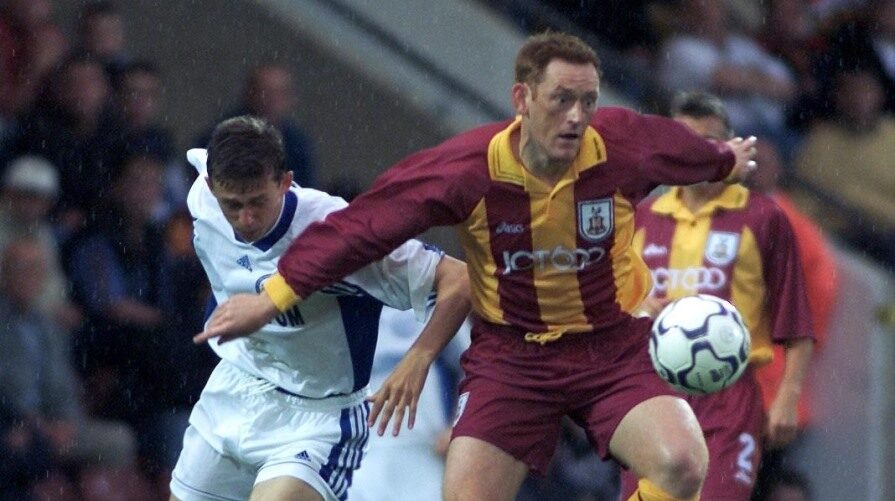By Chris Dunlavy
WEMBLEY, May 1997. The temperature at pitchside is over 30. The players of Crystal Palace and Sheffield United, scrapping for a place in the Premier League, are sunbaked and burnt out.
Extra-time beckons. For Palace supporters, already sweating, these are tense times. A year earlier, they'd watched Steve Claridge and Leicester dramatically shatter their dreams with the final kick of a classic play-off final. The pain remains raw.
Then, with 30 seconds remaining, the Eagles win a corner. It's taken short, lofted in, hastily cleared to the edge of the box.
David Hopkin, lurking, pulls it down with his left foot, tees it up with his right. It is at this moment that Rob Hawthorne, commentating for Sky, utters the immortal words. “Hopkin, looking to curl one…”
And he did, perfectly into the top corner. “As it dropped, someone behind my shoulder said: ‘Oh no!'” recounts Steve Coppell, the Palace boss that afternoon.
“To this day, I don't know what it meant – not to shoot it, or not to cross it. But the ball almost travelled in slow motion, the way it curled into the net. It was fabulous.”
Ten seconds later, Palace were in the Premier League and Hopkin, the jug-eared, flame-haired Scot, was written into folklore.
A week later, Hopkin made his debut for Scotland, then joined Leeds United for £3.25m. He would go on to play 73 times for the Whites, several as captain, a consistent but largely forgotten cog in the side that flirted with greatness under David O'Leary.
Previously, he'd played 41 games for Chelsea, and before that Greenock Morton. Plucked from a juvenile side in Port Glasgow, the tough shipbuilding town where he grew up, Hopkin was coached and cajoled by Allan McGraw, a manager who thrived on developing raw talent. Within four years, he was playing alongside Dennis Wise and Ruud Gullit.
Later, hamstrung by age and injury, Hopkin would become Bradford City's record signing and make an ill-fated return to Selhurst Park. Yet that majestic strike at Wembley, his 17th goal of a landmark season, seemed destined to remain the defining moment of Hopkin's career.
Until, that is, he entered the dugout. Hopkin had first joined Livingston as assistant to former Celtic star Mark Burchill in January 2015.
“The reason I brought him to Livingston was that he was no-nonsense,” said Burchill, who had played with Hopkin for Scotland and then spent four summers doing his coaching badges alongside the former midfielder.
“He said it like it was, he wasn't scared of anyone, and he wasn't scared of any situation, whereas I was maybe a bit more pragmatic in my approach. You're looking for someone like that as your assistant — a ‘bad cop', almost.”
Livi clung to Championship status that season, but struggled the next. Burchill departed. Hopkin stepped up. Livi went down anyway, but a revolution had begun.
Hopkin stripped the squad to its bare bones, recruiting young and promoting from within. Within a year, Livi were back in the Championship.
Within two, they were in the SPL, defying relegation odds and a bottom-three budget to see off sides both richer and more illustrious.
The final triumph was a play-off final victory over Partick Thistle. After 21 years, that moment in the Wembley sun had finally been eclipsed.
“That's immortality for David,” said Jim Leishman, the former Livi boss who'd orchestrated the club's first-ever European campaign. “It's a special achievement and he's a special leader.”
Burchill added: “It was a miracle, really. His budget was comparable with the teams in the relegation area, so to get where they got to was incredible. Nobody can take away from the achievement.”
Some tried. By his own admission, Hopkin had an image problem during his playing days. The tattoos, the swearing, the boxer's face – even Burchill thought he was a “nutter” when they first met on Scotland duty.
Hopkin was seen as an old-school enforcer and rarely given credit for his moments of skill and invention. Nor for what Burchill calls a “likeable charm and personality”, or the business savvy that saw him build a portfolio of 28 properties across the UK. In management, too, his team was occasionally derided for being physical and functional, despite scoring 136 goals over two seasons.
“I think it all goes back to when I was playing,” he told the Times last year. “I was seen as this serious, angry guy who played football.
“But I just took my job seriously. And I've taken the same attitude into management. I was captain at most of the clubs I played for and I think you need those same qualities in football management.”
Most, though, were united in praise for the job Hopkin did at Livi, and shocked when he left just months after promotion, determined to forge a career in England. Those who worked with him had no doubt he would succeed.
“He has the ability to go as far as he wants in the game,” said John Hartson, the former Wales striker who worked as a coach at Livingston. “He's a coaching manager who likes to promote young players and rescue others whose careers have drifted or stalled. He reminds me of Harry Redknapp or Martin O'Neill.”
Scott Pittman, a player at Livi, agrees. “Now he is in League One,” said Pittman, after Hopkin was appointed by Bradford last month. “But I don't think it will be long before he is managing at a really high level down there. He is that good.”

















